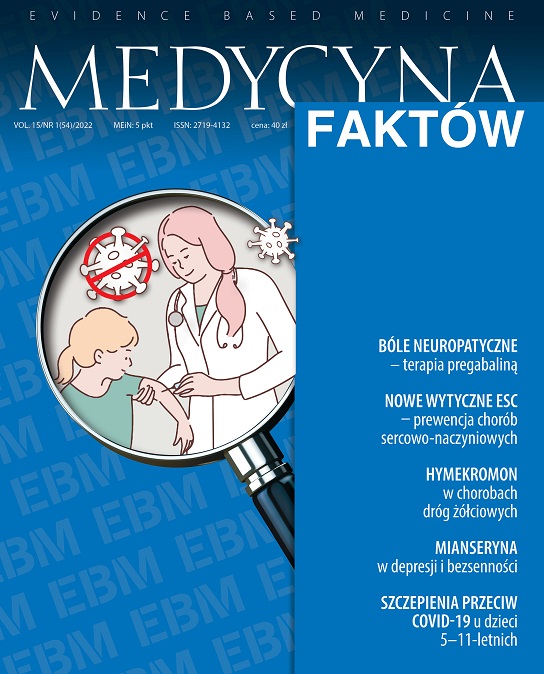6 reasons why to use ozanimod in relapsing and remitting treatment forms of multiple sclerosis Review article
Main Article Content
Abstract
Multiple sclerosis is a chronic disease of the central nervous system with white matter damage and loss of oligodendrocytes and neurons. The sphingosine-1-phosphate receptor modulators are available therapies modifying the course of the disease. Ozanimod, with its selective mechanism of action, ensures high effectiveness and safety of treatment of a relapsing and remitting form of this disease.
Article Details
How to Cite
Ambrosius , W. (2022). 6 reasons why to use ozanimod in relapsing and remitting treatment forms of multiple sclerosis. Medycyna Faktow (J EBM), 15(1(54), 79-82. https://doi.org/10.24292/01.MF.0122.11
Issue
Section
Articles
Copyright ? by Medical Education. All rights reserved.
References
1. Bonek R (ed). Stwardnienie rozsiane. Wydawnictwo Lekarskie PZWL, Warszawa 2019: 13-73.
2. Walton C, King R, Rechtman L et al. Rising prevalence of multiple sclerosis worldwide: Insights from the Atlas of MS. Mult Scler J. 2020; 26(14): 1816-21.
3. Kapica-Topczewska K, Collin F, Tarasiuk J et al. Clinical and epidemiological characteristics of multiple sclerosis patients receiving disease-modifying treatment in Poland. Neurologia i Neurochirurgia Polska. 2020; 54(2): 161-8.
4. Giovannoni G, Butzkueven H, Dhib-Jalbut S et al. Brain health: time matters in multiple sclerosis. Mult Scler Relat Disord. 2016; 9: S5-48.
5. Obinata H, Hla T. Sphingosine 1-phosphate and inflammation. Int Immunol. 2019; 31(9): 617-25.
6. McGinley MP, Cohen JA. Sphingosine 1-phosphate receptor modulators in multiple sclerosis and other conditions. Lancet. 2021; 398(10306): 1184-94.
7. Comi G, Kappos L, Selmaj KW et al. Safety and efficacy of ozanimod versus interferon beta-1a in relapsing multiple sclerosis (SUNBEAM): a multicentre, randomised, minimum 12-month, phase 3 trial. The Lancet Neurology. 2019; 18(11): 1009-20.
8. Cohen JA, Comi G, Selmaj KW et al. Safety and efficacy of ozanimod versus interferon beta-1a in relapsing multiple sclerosis (RADIANCE): a multicentre, randomised, 24-month, phase 3 trial. Lancet Neurology. 2019; 18(11): 1021-33.
9. Brochet B, Ruet A. Cognitive Impairment in Multiple Sclerosis With Regards to Disease Duration and Clinical Phenotypes. Front Neurol. 2019; 10: 261. http://doi.org/10.3389/fneur.2019.00261.
10. Strober L, DeLuca J, Benedict RH et al. Symbol Digit Modalities Test: A valid clinical trial endpoint for measuring cognition in multiple sclerosis. Mult Scler. 2019; 25(13): 1781-90.
11. DeLuca J, Schippling S, Montalban X et al. Effect of Ozanimod on Symbol Digit Modalities Test Performance in Relapsing MS. Mult Scler Relat Disord. 2021; 48: 102673.
12. Andravizou A, Dardiotis E, Artemiadis A et al. Brain atrophy in multiple sclerosis: mechanisms, clinical relevance and treatment options. Auto Immun Highlights. 2019; 10(1): 7.
13. Swallow E, Patterson-Lomba O, Yin L et al. Comparative safety and efficacy of ozanimod versus fingolimod for relapsing multiple sclerosis. J Comp Eff Res. 2020; 9(4): 275-85.
14. Mardan J, Hussain MA, Allan M. Objective medication adherence and persistence in people with multiple sclerosis: a systematic review, meta-analysis, and meta-regression. J Manag Care Spec Pharm. 2021; 27(9): 1273-95.
2. Walton C, King R, Rechtman L et al. Rising prevalence of multiple sclerosis worldwide: Insights from the Atlas of MS. Mult Scler J. 2020; 26(14): 1816-21.
3. Kapica-Topczewska K, Collin F, Tarasiuk J et al. Clinical and epidemiological characteristics of multiple sclerosis patients receiving disease-modifying treatment in Poland. Neurologia i Neurochirurgia Polska. 2020; 54(2): 161-8.
4. Giovannoni G, Butzkueven H, Dhib-Jalbut S et al. Brain health: time matters in multiple sclerosis. Mult Scler Relat Disord. 2016; 9: S5-48.
5. Obinata H, Hla T. Sphingosine 1-phosphate and inflammation. Int Immunol. 2019; 31(9): 617-25.
6. McGinley MP, Cohen JA. Sphingosine 1-phosphate receptor modulators in multiple sclerosis and other conditions. Lancet. 2021; 398(10306): 1184-94.
7. Comi G, Kappos L, Selmaj KW et al. Safety and efficacy of ozanimod versus interferon beta-1a in relapsing multiple sclerosis (SUNBEAM): a multicentre, randomised, minimum 12-month, phase 3 trial. The Lancet Neurology. 2019; 18(11): 1009-20.
8. Cohen JA, Comi G, Selmaj KW et al. Safety and efficacy of ozanimod versus interferon beta-1a in relapsing multiple sclerosis (RADIANCE): a multicentre, randomised, 24-month, phase 3 trial. Lancet Neurology. 2019; 18(11): 1021-33.
9. Brochet B, Ruet A. Cognitive Impairment in Multiple Sclerosis With Regards to Disease Duration and Clinical Phenotypes. Front Neurol. 2019; 10: 261. http://doi.org/10.3389/fneur.2019.00261.
10. Strober L, DeLuca J, Benedict RH et al. Symbol Digit Modalities Test: A valid clinical trial endpoint for measuring cognition in multiple sclerosis. Mult Scler. 2019; 25(13): 1781-90.
11. DeLuca J, Schippling S, Montalban X et al. Effect of Ozanimod on Symbol Digit Modalities Test Performance in Relapsing MS. Mult Scler Relat Disord. 2021; 48: 102673.
12. Andravizou A, Dardiotis E, Artemiadis A et al. Brain atrophy in multiple sclerosis: mechanisms, clinical relevance and treatment options. Auto Immun Highlights. 2019; 10(1): 7.
13. Swallow E, Patterson-Lomba O, Yin L et al. Comparative safety and efficacy of ozanimod versus fingolimod for relapsing multiple sclerosis. J Comp Eff Res. 2020; 9(4): 275-85.
14. Mardan J, Hussain MA, Allan M. Objective medication adherence and persistence in people with multiple sclerosis: a systematic review, meta-analysis, and meta-regression. J Manag Care Spec Pharm. 2021; 27(9): 1273-95.

